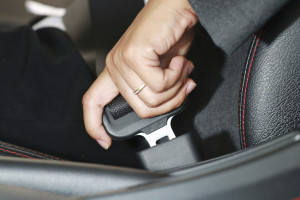 I remember playing with my brother in the back seat of the family car. We were on a road trip. I do not recall the destination.
I remember playing with my brother in the back seat of the family car. We were on a road trip. I do not recall the destination.
I remember that the floor area of the back seat was packed with stuff and that my brother and I played on a thin mattress on top. We were not in seatbelts.
It was the early-mid 1970s. Seatbelts were not commonplace then.
Imagine, today, glancing into the back seat of a car and seeing unbelted children playing on a mattress. Many people would bang on the driver’s window and give a piece of their mind. The media campaign to get us all to buckle up has been incredibly successful.
I feel naked if I am sitting in a vehicle without a seatbelt on. Seeing anyone not wearing a seatbelt looks out of place.
The only time I regularly see vehicle occupants not wearing seatbelts is when I’m a passenger in a taxi cab. When I have raised the topic with taxi drivers, I have been told that they don’t have to wear them.
How’s that for a reason. A taxi driver is not compelled by law to pull the seatbelt around his or her body.
Do we stop at stop signs, not drink and drive, signal when we turn, stop behind school busses and slow down to 30 kms/hour in school zones because those driving behaviours are required by law?
Think about it. To a large extent, the answer is yes. How pathetic is that. We should be adopting safe driving behaviours, and wearing our seatbelts, because we want to save lives and reduce injury, not because the law requires it. Our driving mentality has to change, folks.
A Vancouver taxi driver, Mr. Sangha, was injured in a crash on May 31, 2005. The case went to trial in April, 2012, and the judge released her decision on May 23, 2012.
Mr. Sangha had not been wearing his seatbelt because a City of Vancouver bylaw exempts taxi drivers from wearing a seatbelt if they are travelling under 70 kms/hour.
The defence, effectively ICBC, sought to reduce Mr. Sangha’s entitlement to compensation for his injuries and losses because he had not been wearing a seatbelt. They wanted the court to find that there was, in legal terms, “contributory negligence” on Mr. Sangha’s part, that his failure to wear a seatbelt contributed to his injuries and losses.
The judge, Madam Justice Boyd, carefully considered the defence position. She reviewed the law that quite clearly opens the door for a defence argument of contributory negligence even if the law does not compel seatbelt use.
Consider that law the next time you are frolicking in a limousine, or riding a bus. If you won’t wear a seatbelt because you are not compelled to by law or for your own safety, consider wearing a seatbelt because ICBC could use your failure to do so as an excuse to reduce the compensation you are entitled to if you are injured in a crash.
Fortunately for Mr. Sangha, Madam Justice Boyd was, in her words, “unable to find that any specific injury suffered by the plaintiff was caused by any specific movement in the vehicle which would have been avoided had he been wearing a seatbelt.”. She rejected the defence position that it was a matter of “common sense” that Mr. Sangha’s injuries would have been avoided, or lessened, if he had been wearing his seatbelt. His compensation was not reduced as a result of his failure to wear a seatbelt.
As dumb as it may be not to wear a seatbelt, failure to do so will not reduce the defence responsibility to fairly compensate for the injuries and other losses arising from bad driving unless the defence can prove that wearing a seatbelt would have prevented or lessened those injuries and losses.
Don’t be dumb. Wear your seatbelt. Generally, please take care for your own safety and the safety of others because it’s the right thing to do, not because the law requires it or because your injury claim might be impacted if you fail to do so.
Published September 13, 2012 in the Kelowna Capital News

0 Comments